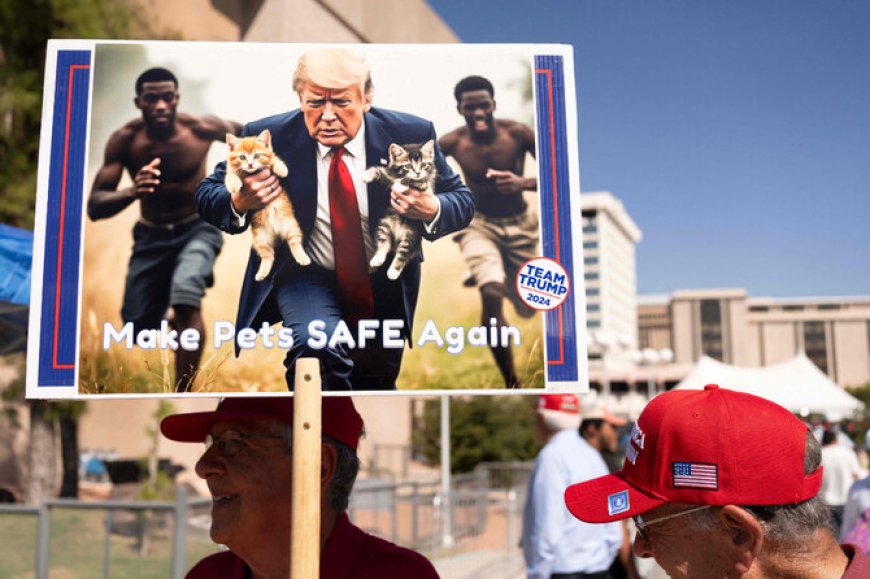Opinion: Trump’s Falsehoods About Haitians Are Fanning Dangerous Flames in Ohio

The recent bomb threats that forced the evacuation of schools and government offices in Springfield, Ohio, are the latest disturbing outcome of the toxic rhetoric swirling around the 2024 election cycle. These threats followed former President Donald Trump's baseless claims that Haitian immigrants in the area were abducting and eating pets.
What began as a shocking falsehood propagated on the campaign trail has now sparked real-world consequences, causing fear and chaos in a community already grappling with the challenges of immigration.
It is not the first time Trump has resorted to fearmongering to stoke the flames of division and paranoia. However, the recent comments he made during a rally in Tucson, Arizona, about Haitian immigrants in Springfield were particularly egregious. He falsely claimed that these immigrants were responsible for abducting and consuming pets—a narrative that taps into racist stereotypes and dehumanizes those seeking refuge in the U.S.
These comments, though easily debunked, gained traction among some circles. A week after the rally, Springfield found itself under siege from bomb threats targeting city officials and schools. The emails threatened to detonate explosives at multiple locations, including the homes of city leaders and various public buildings. Authorities, taking the threats seriously, evacuated and swept the areas for explosives, thankfully finding none. However, the community is left shaken by this wave of fear.
The Roots of the Problem: Rhetoric and Immigration Tensions
The source of these bomb threats can be traced directly to Trump’s rhetoric. At a time when the country is already grappling with political polarization, racial tension, and immigration challenges, such inflammatory language does more than just grab headlines—it fuels dangerous actions. Springfield’s immigrant community, particularly Haitians, has become the target of unsubstantiated rumors and conspiracies, casting them as villains in a narrative of fear.
The claims started months ago when baseless rumors circulated about Haitian immigrants allegedly catching and eating fowl in public parks. It wasn’t long before the lies snowballed, leading to a sign in a local park that read, “Please Do Not Eat The Ducks.” Though the sign was promptly removed, the damage had already been done. Trump’s repeated amplification of this narrative, echoed by his running mate, Ohio Senator JD Vance, has further fanned the flames of resentment.
In reality, Springfield is home to around 60,000 residents, predominantly white and blue-collar, and it has been facing real challenges as the community adjusts to an influx of Haitian immigrants. Mayor Rob Rue has acknowledged these issues, from strained resources in hospitals and schools to an increased burden on local law enforcement. While these are legitimate concerns, they have been exacerbated by the irresponsible amplification of lies rather than constructive, solutions-focused dialogue.
The Responsibility of Leaders
The role of political leaders in addressing—or exacerbating—such tensions cannot be overstated. Instead of working to address the immigration challenges facing Springfield in a thoughtful and responsible way, Trump and his allies have chosen to inflame the situation with baseless claims that stir up fear and hostility. Such rhetoric not only puts the safety of immigrants at risk but also threatens the social cohesion of the broader community.
Governor Mike DeWine, to his credit, has recognized the strain that Springfield is under and pledged $2.5 million to bolster primary health care services in the area. Additionally, the Ohio State Highway Patrol will assist local law enforcement with traffic issues caused by the influx of new residents unfamiliar with U.S. traffic laws. While these are positive steps, they are band-aid solutions to deeper systemic challenges that require national leadership and policy reform.
Unfortunately, Trump’s rhetoric makes meaningful solutions more difficult to achieve. By framing immigrants as criminals or threats, he diverts attention away from the real issues facing communities like Springfield: a lack of resources, strained services, and the need for comprehensive immigration reform. Instead of fostering unity and problem-solving, Trump has sown division and suspicion.
A Community Under Siege
In the face of these challenges, Springfield residents are left to deal with the consequences of a narrative they did not ask for. While bomb threats have temporarily subsided, the underlying tension remains. Mayor Rue, in an interview, emphasized that Springfield is still a beautiful and safe place to live, dismissing the wild claims made by Trump as untrue. However, the mayor also admitted that the city has been asking for federal assistance for months, acknowledging the cultural clash that has emerged as the city tries to integrate its new Haitian residents.
What’s clear is that Springfield, like many American communities, needs support—not only in terms of financial resources but also in terms of leadership that fosters unity rather than division. False rumors, whether about immigrants or any other group, have real-world consequences, and the bomb threats in Ohio are a stark reminder of the dangers of irresponsible rhetoric.
The Broader Implications
The situation in Springfield serves as a microcosm of a much larger issue: the toxic interplay of politics, misinformation, and fear in America today. As the 2024 presidential election draws nearer, the potential for such dangerous rhetoric to incite violence and chaos becomes more apparent. It is the responsibility of leaders to promote facts and empathy, not fiction and fear.
Trump’s tactics may resonate with certain voters, but they come at a significant cost to communities like Springfield. The fear, division, and instability generated by such rhetoric undermine the democratic process and the values that should guide national discourse. It is time for leaders, regardless of political affiliation, to prioritize truth and the well-being of all Americans—immigrants included—over political gamesmanship.
In the end, the future of communities like Springfield depends on how we choose to navigate these challenges. Will we allow lies to dictate our actions, or will we seek out solutions that promote safety, inclusion, and progress for all? The choice is ours, and the stakes have never been higher.













































